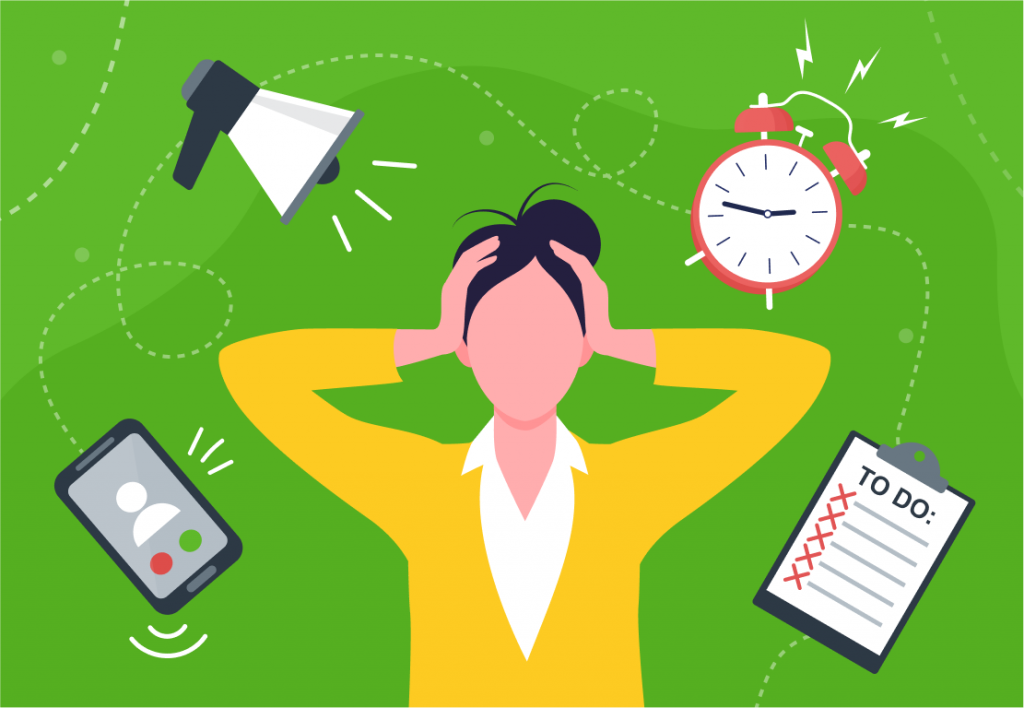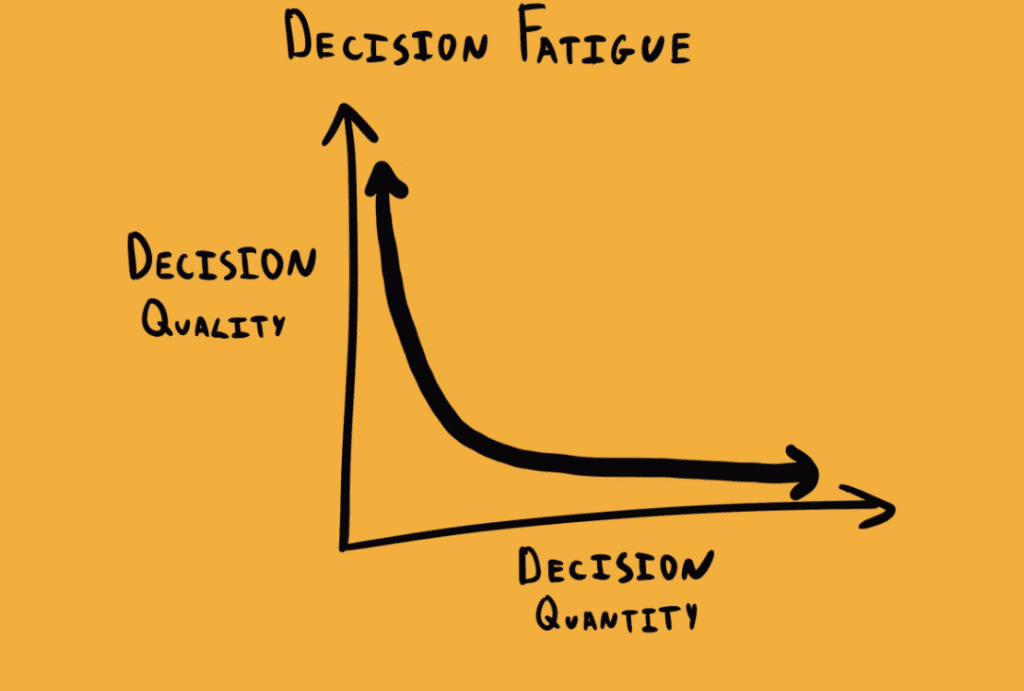
From the moment we wake up, we must deal with a continuous stream of choices. Some are minor, like what to make for breakfast, while others are more difficult, like choosing where to live. Without the right mindset and attitude, the avalanche of decisions we make each day can be overwhelming. The term used to describe this mental overload is decision fatigue. Learn the signs of decision fatigue and the steps you can take to ease your decision-making process to make the best choices. (Estimated reading time: 10 minutes)
“Never make a decision when you are upset, sad, jealous or in love.”
— Mario Teguh
Making sound and informed decisions is an art learned through life experience and gaining certain skill sets. Knowing how to do it well is critical to our success and wellbeing.
While fate puts opportunities in front of us, we must act on them based on our decisions. For instance, if you attend an event and meet the person of your dreams (an act of fate), you must decide whether to ask them out.
Decision-making isn’t easy in and of itself. It becomes more complex and cumbersome the more decisions we have to make. From the moment we wake up, we must deal with a continuous flow of choices. Some are minor, like what to make for breakfast, while others are more difficult, like deciding whether to relocate to another state or country.
Some sources estimate that we make around 35,000 decisions daily (226.7 decisions are on food alone) – some are calculated, some are compulsive, and there are some that we’re not conscious of making at all.
Managing not to be overwhelmed by constant decision-making is a modern-day requirement. Living in the age of capitalism and rapid change brings an abundance of choices. It’s the new normal. This is in sharp contrast to our ancestors, who lived simpler lives that required them to make a fraction of the choices we have today.
When seen from this perspective, we can be appreciative of the freedom we have. But, without the right mindset and attitude, the avalanche of decisions we make each day can be emotionally and cognitively demanding, making it harder to adapt to unpredictability.
The term used to describe this mental overload is decision fatigue. To prevent it from impeding our ability to make good decisions, we must understand the causes and ways to overcome it.
What is decision fatigue?

Coined by psychologist Roy F. Baumeister, decision fatigue describes an impaired ability to make decisions because of a burden of choices. The stress from too many decisions can cause us to shut down, avoid, or make poor, hasty choices.
Even if you’ve never heard of decision fatigue, you have probably experienced it. Think about the last time you were in a grocery store. Imagine walking down the cereal aisle and observing rows and rows of different brands and types of cereal: sugar-free, high fiber, low carb, organic, GMO-free, etc. If you’re anything like me, you find this scene nightmarish.
The colors, designs, and nutrition labels are too much. After your eyes race up and down the aisle, all boxes appear the same, and none stand out. Unless you know what you want, you’ll grab something that looks familiar or has the flashiest package.
Decision fatigue can play out in other settings as well, whenever you find yourself in a situation where you have an “I have no idea what to do” feeling. Were you reading a restaurant menu? Browsing a shopping catalog? Swiping through a zillion dating profiles? In all cases, you can feel your mind scrambling to process the potential choices and pick the best one.
Signs of decision fatigue
Decision fatigue may be a chronic issue for some, but it occurs in specific situations for most people. Here are five tell-tale signs that you’re experiencing burnout from decision fatigue:
Decision paralysis: Feeling stuck because you’re spending too much time weighing pros and cons and trying to pinpoint risks and flaws.
Brain fog: Not having the mental bandwidth to process all the information and data involved in a decision. It can leave you feeling disoriented and incapable of evaluating your choices.
Stress and anxiety: Worrying about making the wrong choice that causes undue stress and a fear of the consequences of choosing poorly.
Irritability: Feeling short-tempered because of the frustration of making a choice.
Impulsivity and lack of willpower: When you’re too busy, or in a rush, you might not have the willpower to opt for healthier options that require more thought and deliberation.
Avoidance and procrastination: Often caused by a fear of making the wrong choice or poor time management, avoiding decisions can be a way of coping with decision fatigue.
If you find yourself saying things like, “I can’t deal with this now,” “I’ll tackle this tomorrow,” or “the best option is the fastest and easiest one,” you’re displaying signs of decision fatigue.
Spotting these symptoms early on can prevent the stress of decision fatigue from snowballing into more severe conditions like chronic anxiety, irritability, depression, and physical effects like digestive problems and headaches.
Why do we experience decision fatigue?

Decision fatigue is more than just a feeling. It’s a product of how our brains function. We experience it because our brains don’t have the cognitive capacity to make decisions beyond a certain threshold.
Our responses may also be magnified by our personality types, health, stress levels, or personal circumstances.
A person is more vulnerable to decision fatigue if they:
- Make decisions that stress them out
- Feel emotional about the decisions they are making
- Make many decisions throughout the day
- Make decisions that impact the lives of other people
- Make decisions that have long-term consequences and dramatically change their lives
- Are not in a strong mental, physical, and emotional state
- Lack confidence in themselves and are anxiety-prone
- Make complex decisions with many factors to consider
Research shows a sweet spot for brain function regarding the number of choices. In a study, when people were asked to choose from sets of 6, 12 or 24 items, there was increased activity in the decision-making and impulse control brain centers when people had 12 choices. The subjects backed this up by saying six things felt like the right amount for them.
Dr. Roy F. Baumeister explained these diminished mental abilities through the ego depletion theory. The theory states that willpower draws upon a limited reserve of mental energy. Once it’s used up, we’re likely to lose self-control.
At this point, it is more challenging to balance decisions that fulfill immediate needs versus those that are more responsible and beneficial. As our mental reserve shrinks, our executive centers, situated in the prefrontal cortex of our brains, have less power. This reduces our capacity to make rational and well-thought-out decisions.
The theory of ego depletion implies that willpower is limited and should be managed carefully. However, some theories, like the one published in the study by Carol Dweck, conclude that ego depletion is only present in subjects who believe willpower is limited.
The science behind the cause of decision fatigue may be contradictory, but it doesn’t take away from how real it is. What ultimately matters is the weight of the decisions we face, their implications, and what we do about them.
Why should we be concerned about decision fatigue?

When not managed well, decision fatigue can significantly reduce our ability to make good decisions. It can manifest in different ways depending on how it impacts us. Here are six common issues caused by decision fatigue that we should be concerned about:
Impulse buying
Decision fatigue can cause us to make impulse purchases. We are less likely to resist items on sale and those near the checkout.
You may have experienced this while shopping in a grocery store after a long day of work. The candy and baked goods look a lot more appealing than they would if you were there in the morning.
Trade-offs
A trade-off is when you have to choose between options, each with pros and cons. Evaluating options can be energy-consuming, especially if the stakes are high.
A mentally depleted person becomes reluctant to make decisions or makes poor ones. That’s why big purchases like a home or a car can feel taxing because of all the factors we must consider before buying them.
Decision avoidance
Decisions can cause a person to delay, procrastinate, or avoid decisions entirely. Not putting in the thought needed can land them with the default option, or they may leave the choice to others.
Avoiding decisions can be a major problem in an office setting when a manager often does not have the luxury to delay making decisions. In these cases, it could result in a loss for the business.
Impaired self-regulation
The process of choosing can leave us feeling drained and incapable of self-regulation. This fatigue causes us to choose poorly in important areas like health, work and family. We may sabotage our wellbeing by overeating, underachieving at work or arguing with our loved ones.
Being prone to decision-making biases
When we experience decision fatigue, we’re more likely to rely on mental shortcuts and be biased.
Based on a study from Columbia Business School, the percentage of favorable rulings by judges on parole boards dropped from 65% to 0% during a decision session. After a break, the favorable rulings returned to 65%, suggesting that judicial decisions were increasingly determined by bias as decision fatigue set in.
Decisional conflict and regret
Decision fatigue can cause us to experience a higher degree of inner conflict. In this state, we’re uncertain about which course of action to take when deciding between options. After making a decision, we are more likely to experience regret, especially if we know we were not in the right frame of mind when choosing.
We need to streamline the decision process beforehand to avoid all these effects. This will put us in a much better place to handle them with ease and discernment.
How to cope with decision fatigue and make smarter choices

A big part of becoming a better decision-maker is knowing how to overcome decision fatigue. If you’re dealing with decision fatigue, here are four coping strategies to handle it and hopefully move past it:
1. Prioritize your wellbeing
It goes without saying that you make better decisions when you feel healthy and good about yourself. To achieve this optimum state of wellbeing, you need to take care of yourself and prioritize your health. Here are some tips to keep in mind:
- Get enough sleep: Sleep is crucial in decision-making and willpower. A good night’s rest improves mental and emotional health. It puts us in a stronger position to make decisions than if we were sleep deprived and exhausted.
- Work with your body clock: Not everyone has the same body clock. Understanding your unique circadian rhythm lets you know when it is best to rest, work, and make decisions.
- Pace yourself and take breaks: If you’re running low on steam, hit the brakes and take time out to recharge. You might benefit from a meditation session or a short nap to refresh your mind. Make sure you include time to rest and recover between activities.
- Tune into your emotions: People often don’t realize that they’re experiencing decision fatigue because they’re too busy running from one thing to the next. If you experience any of the symptoms, put off making decisions until you feel better.
2. Limit the number of choices you have to make and automate when possible
A simple way to reduce decision fatigue is by limiting the number of decisions you have to make. Successful individuals like Steve Jobs, Barack Obama, and Mark Zuckerberg wear the same outfits consistently because they don’t want to spend their mental resources deciding what to wear every day.
Limit yourself to no more than a few big decisions per day. Automating your life is also another way to reduce the number of choices you have to make. You can create meal plans and simplify your wardrobe and other rituals that align with your vision.
3. Delegate and get support from others
Build a support system and network that can sustain you. If possible, delegate some of the decisions to lighten your mental load. For example, you can ask your partner to pick a restaurant on your weekly date nights. You can ask your friends and colleagues for input when making a choice. They can be a resource in reviewing pros and cons, but make sure that you consult those you trust can offer clear and sound advice.
4. Develop habits that improve your process
Incorporate these nine habits to simplify your decision-making process:
- Plan your schedule a week in advance, so you’re better prepared for the next day.
- Avoid overthinking minor decisions, as you’ll need the energy for more important ones.
- Prioritize your decisions and create timelines and deadlines for yourself. This will keep you on track and give you time to prepare for what’s to come.
- Make critical decisions at a time when your mind functions at its peak.
- Don’t make decisions if you’re not confident and need more time and information.
- Avoid making impulsive and last-minute decisions.
- Remove distractions that cloud your mind and diminish your focus.
- If people press you to make decisions, ask for space and time to think about it.
- After making a well-thought-out decision, commit to it and be confident in your choice.
No matter what the conditions are in your life, you can transform them by making favorable decisions. With each choice, your destiny is shaped, slowly but surely. Know that you always have, and always will, have this power. Use it with intention and purpose.
All my best on your journey,
Seline

Question for you: Have you ever experienced decision fatigue? What were the symptoms you experienced, and how did you get back to center?
Did you like this post? Sign up below, and I’ll send you more awesome posts like this every week.

Hi Seline — I love this content, but I have a kind of specific question. Maybe you can help and give me some guidance? I am the sole caretaker for two disabled family members- one with stage 4 cancer and one a disabled autistic child. The fatigue in general is extreme but I have to make so many decisions about so many things no one else can! Is there anything that I can do help hold the fatigue at bay and revive my brain now and then? It feels like oatmeal most of the time. LOL